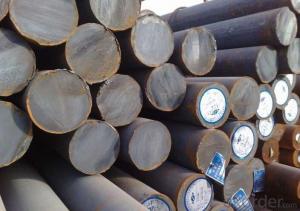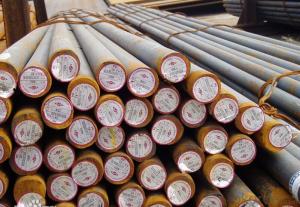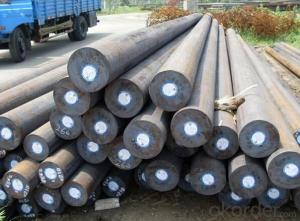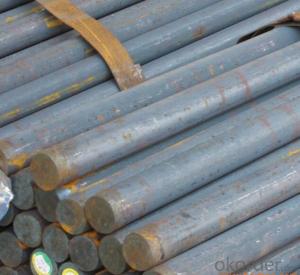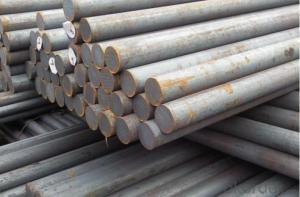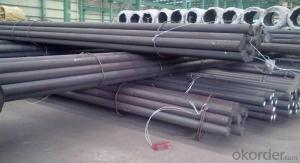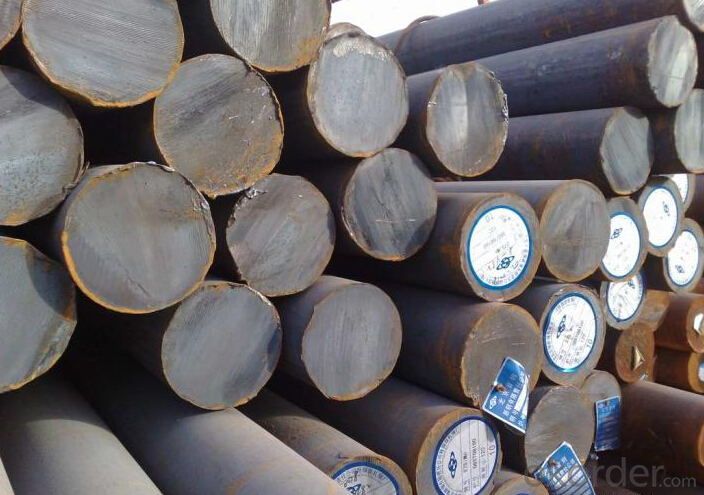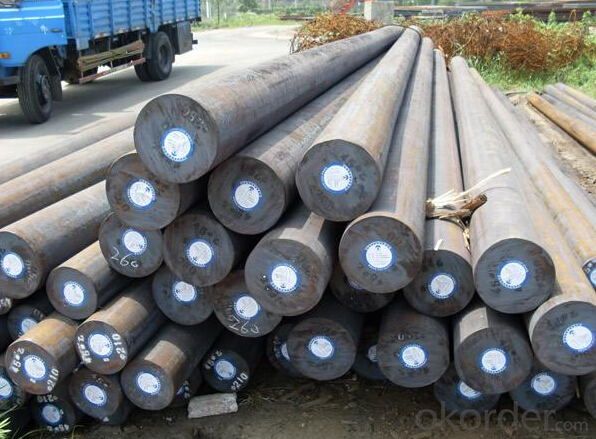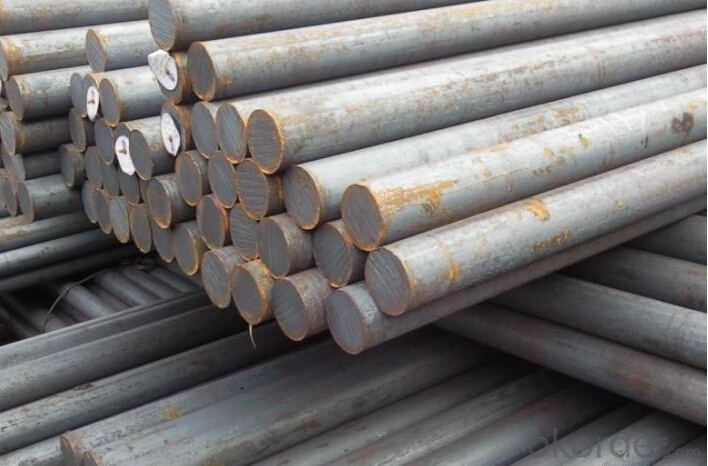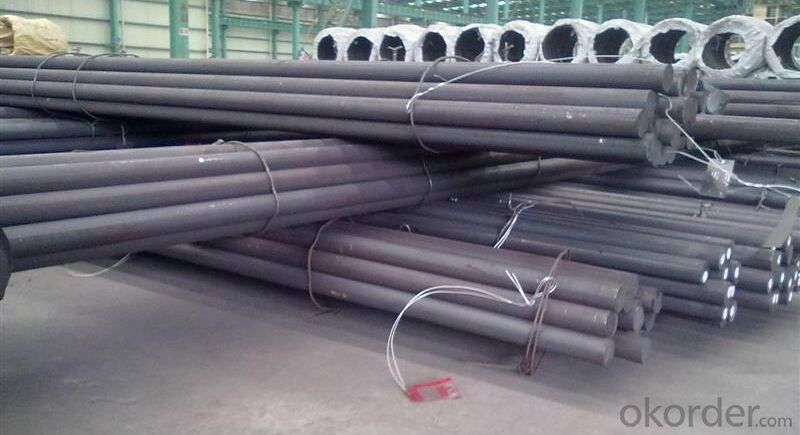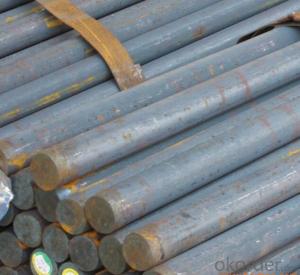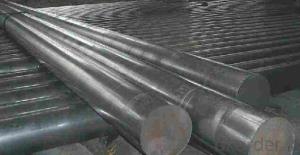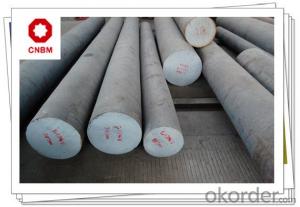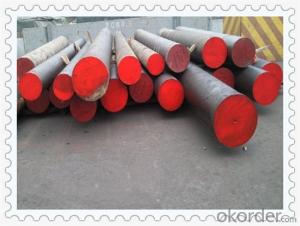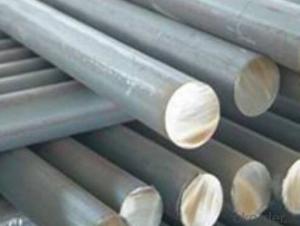aisi high strength carbon alloy steel bars
- Loading Port:
- China main port
- Payment Terms:
- TT OR LC
- Min Order Qty:
- 3 m.t.
- Supply Capability:
- 100000 m.t./month
OKorder Service Pledge
OKorder Financial Service
You Might Also Like
Specification
Shape: Round Bar/Square Bar/Flat Bar/Plate/Wire
Standard: GB/ASTM/SAE/AISI/DIN/JIS/EN/BS
Surface Treatment: Black/Peeling/Polished/Machined
Delivery Condition: Hot Rolled or Forged/Peeled or Black Surface
Test: SGS/UT 100% Elements Testing
Certificate: ISO/Mill Certificate
Service: 24 hours online server more than 20 years trading and manufacture
Quality Assurance: the third party inspection, such as SGS, BV, TUV…etc. is acceptable
Packaging Details: Seaworthy Packaging or as per customer's packing instruction
Are you a trading company or manufacturer? Manufacturer
What’s the MOQ? 3 metric ton
What’s your delivery time? 15-35 days after downpayment received
what’s your delivery terms? FOB/CFR/CIF
What's the Payment Terms? 30% as deposit,70% before shipment by T/T
Western Union acceptable for small amount.
L/C acceptable for large amount.
Scrow ,Paybal,Alipay are also ok
Why choose us? Chose happens because of quality, then price, We can give you both.
Additionally, we can also offer professional products inquiry, products knowledge train (for agents), smooth goods delivery, excellent customer solution proposals.
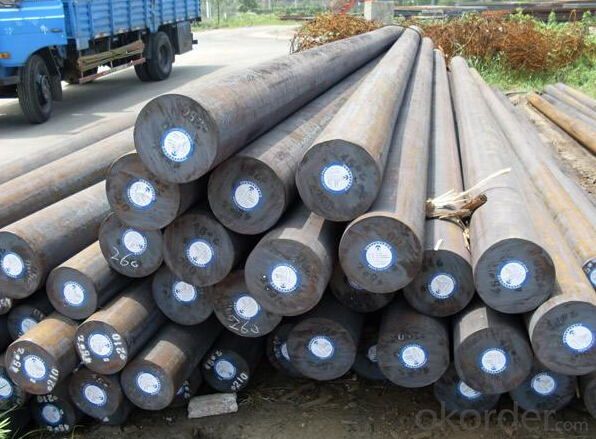
- Q: What are the different surface treatment techniques for special steel?
- There are several surface treatment techniques available for special steel, including electroplating, hot-dip galvanizing, powder coating, and passivation. Electroplating involves depositing a layer of metal onto the steel surface through an electrochemical process, providing enhanced corrosion resistance and aesthetic appeal. Hot-dip galvanizing immerses the steel in molten zinc, forming a protective zinc coating that prevents rusting. Powder coating involves applying a dry powder onto the steel surface, which is then heated and fused to create a durable and decorative finish. Passivation is a chemical process that removes surface contaminants and forms a protective oxide layer on the steel, improving its corrosion resistance.
- Q: What are the non-destructive testing methods used for special steel?
- There are several non-destructive testing (NDT) methods that are commonly used for special steel. These methods are designed to detect flaws or defects in the steel without causing any damage to the material. One of the most widely used NDT methods for special steel is ultrasonic testing. This technique involves sending high-frequency sound waves through the steel and analyzing the echoes that are reflected back. By measuring the time it takes for the sound waves to travel through the steel and return, technicians can determine the thickness, density, and internal structure of the material. Ultrasonic testing is particularly effective at detecting cracks, voids, or inclusions in the steel. Another commonly used NDT method for special steel is magnetic particle testing. This technique involves applying a magnetic field to the surface of the steel and then coating it with a magnetic powder. Any defects or irregularities in the steel will create magnetic flux leakage, causing the magnetic particles to cluster and form visible indications. This method is particularly effective at detecting surface cracks or discontinuities in the steel. Liquid penetrant testing is another NDT method that is often used for special steel. This technique involves applying a liquid dye or fluorescent material to the surface of the steel. The dye penetrates any surface cracks or defects, and after a specified dwell time, excess dye is removed. A developer is then applied, which draws out the dye from any flaws, making them visible under UV light. This method is effective at detecting surface discontinuities and is commonly used in the aerospace and automotive industries. Radiographic testing is another NDT method that can be used for special steel. This technique involves exposing the steel to X-rays or gamma rays and capturing the resulting image on a film or digital detector. By analyzing the radiographic image, technicians can detect internal flaws such as cracks, voids, or inclusions in the steel. This method is particularly useful for thicker sections of steel or when access to the material is limited. In conclusion, non-destructive testing methods such as ultrasonic testing, magnetic particle testing, liquid penetrant testing, and radiographic testing are commonly used for special steel. These methods allow for the detection of flaws or defects in the steel without causing any damage to the material, ensuring its integrity and reliability.
- Q: What are the different methods of surface hardening for special steel?
- There are several methods of surface hardening that can be used for special steel. These methods include: 1. Carburizing: This process involves heating the steel in a carbon-rich environment, such as a gas or liquid, to allow carbon atoms to diffuse into the surface of the steel. This increases the surface hardness and wear resistance of the steel. 2. Nitriding: Nitriding is a process where the steel is heated in a nitrogen-rich environment, causing nitrogen atoms to diffuse into the surface of the steel. This creates a hard, wear-resistant surface layer. 3. Induction hardening: In this method, an alternating current is passed through a coil to create a magnetic field, which induces electrical currents in the steel. The resistance to these currents generates heat, causing the surface of the steel to reach high temperatures and undergo rapid quenching, resulting in increased hardness. 4. Flame hardening: This process involves heating the surface of the steel using a flame or an oxy-fuel torch and then quenching it in water or oil. The rapid cooling from high temperatures helps to achieve surface hardening. 5. Laser hardening: Laser beams are used to heat a specific area of the steel surface, quickly raising the temperature and then rapidly cooling it with a coolant. This localized heating and cooling process increases the hardness of the treated area. 6. Plasma nitriding: In this method, the steel is placed in a low-pressure plasma chamber, where nitrogen ions bombard the surface of the steel, causing nitrogen to diffuse into the surface and form a hardened layer. Each of these methods has its advantages and is suitable for different applications and types of special steel. The choice of surface hardening method depends on factors such as the desired hardness, dimensional limitations, and the specific properties required for the application.
- Q: Can special steel be used in the medical device manufacturing industry?
- Yes, special steel can be used in the medical device manufacturing industry. Special steel alloys, such as stainless steel or titanium, are commonly used in medical device manufacturing due to their excellent corrosion resistance, biocompatibility, and strength characteristics. These alloys are specifically designed to meet the stringent requirements and regulations of the medical industry, making them ideal for producing safe and durable medical devices.
- Q: What are the different stamping grades of special steel?
- The different stamping grades of special steel include stainless steel, high-strength steel, tool steel, and alloy steel. Each grade has unique properties and characteristics that make them suitable for various stamping applications.
- Q: What are the different casting techniques used for special steel?
- There are several casting techniques used for special steel, including investment casting, continuous casting, sand casting, and centrifugal casting. These techniques allow for the production of complex shapes, improved surface finish, and precise control over the metallurgical properties of the steel. Each technique has its advantages and is used depending on the specific requirements of the final product.
- Q: How does special steel contribute to the manufacturing of automotive engine components?
- Special steel plays a crucial role in the manufacturing of automotive engine components by providing enhanced strength, durability, and performance. Due to its unique properties, special steel is used in various critical engine parts, such as crankshafts, camshafts, connecting rods, valve springs, and cylinder heads. One of the primary benefits of special steel in automotive engine components is its exceptional strength. Engine parts made from special steel can withstand high stress, heavy loads, and extreme temperatures without deformation or failure. This strength ensures that the engine operates efficiently and reliably, even under demanding conditions. Moreover, special steel offers superior durability, which is essential for the longevity and performance of engine components. Special steel's resistance to wear, corrosion, and fatigue ensures that the engine parts maintain their functionality over an extended period. This durability translates into increased lifespan and reduced maintenance requirements for the engine, ultimately leading to higher customer satisfaction and lower costs for vehicle owners. The use of special steel in automotive engine components also contributes to improved performance. Special steel allows for the creation of lightweight components, reducing the overall weight of the engine and improving fuel efficiency. Additionally, the high precision and dimensional accuracy achievable with special steel manufacturing processes result in better engine performance, reduced friction, and improved power output. Furthermore, special steel offers excellent machinability, which simplifies the manufacturing process of engine components. Its ability to be easily formed, cut, and shaped enables the production of complex designs and intricate features, leading to enhanced efficiency and performance in the final product. In summary, special steel is vital in the manufacturing of automotive engine components due to its exceptional strength, durability, and performance. Its usage results in engines that are more reliable, efficient, and long-lasting, ultimately contributing to the overall quality and satisfaction of vehicles.
- Q: What are the different renewable energy grades of special steel?
- The renewable energy industry commonly utilizes various grades of special steel. These grades are specifically engineered to endure the demanding conditions and needs of renewable energy applications. Stainless steel is one of the most prevalent grades of special steel employed in renewable energy. It is renowned for its ability to resist corrosion, making it an excellent choice for offshore wind turbines and solar panel frames that are exposed to moisture and saltwater. It is also utilized in geothermal power plants, where harsh temperatures and corrosive environments exist. Another grade of special steel utilized in renewable energy is high-strength low-alloy (HSLA) steel. This type of steel possesses a higher strength-to-weight ratio, rendering it suitable for lightweight structures requiring high strength, such as wind turbine towers or support structures for solar panels. Additionally, advanced high-strength steel (AHSS), commonly used in the automotive industry, can also find application in renewable energy. AHSS offers exceptional strength, durability, and impact resistance, making it ideal for components like wind turbine blades or gears. Furthermore, weathering steel is a grade of steel frequently employed in renewable energy applications exposed to outdoor elements. This type of steel develops a protective layer of rust, which prevents further corrosion and obviates the need for additional coatings. It is commonly found in solar panel support structures, transmission towers, and other outdoor equipment. Ultimately, the choice of the appropriate grade of special steel for a particular renewable energy application relies on several factors, including the type of renewable energy source, the installation environment, and the project's specific requirements.
- Q: What are the main advantages of using special steel in the automotive racing industry?
- The main advantages of using special steel in the automotive racing industry are its high strength-to-weight ratio, exceptional durability, and excellent thermal conductivity. Special steel allows for the construction of lighter and stronger components, enhancing the overall performance and speed of racing vehicles. It also ensures greater safety for drivers by providing increased resistance to impact and fatigue. Furthermore, the superior thermal conductivity of special steel aids in dissipating heat generated during intense racing conditions, preventing overheating and maintaining optimal engine performance.
- Q: How does special steel perform in renewable energy applications?
- Special steel is a key component in various renewable energy applications and plays a significant role in their performance and durability. The unique properties of special steel, such as its high strength, corrosion resistance, and temperature stability, make it an ideal choice for use in renewable energy technologies. One of the major renewable energy applications where special steel excels is in wind turbines. Wind turbine components, such as the tower, rotor blades, and gearbox, require materials that can withstand harsh environmental conditions and high mechanical loads. Special steel alloys offer excellent strength-to-weight ratios, allowing for lighter and more efficient turbine designs. Additionally, their corrosion resistance properties ensure longevity and reduced maintenance requirements, resulting in increased reliability and overall performance of the wind turbine. In solar power applications, special steel is used in the construction of solar panels and support structures. Solar panels require frames made of durable material to withstand external forces and extreme weather conditions. By utilizing special steel, solar panels can be manufactured to be lightweight, yet strong enough to support the weight of the photovoltaic cells. Furthermore, the corrosion resistance of special steel ensures that the panels remain intact, even in harsh environments. Moreover, special steel is also employed in the production of hydroelectric power. In hydro turbines, the corrosive nature of water and the high pressure and temperature conditions necessitate the use of materials that can withstand such environments. Special steel offers excellent resistance to corrosion, erosion, and cavitation, making it a reliable choice for hydroelectric power generation. Its strength and durability ensure the turbines can operate efficiently and withstand the forces exerted by the flowing water. Overall, special steel performs exceptionally well in renewable energy applications by enhancing the reliability, longevity, and efficiency of various technologies. Its unique properties make it an indispensable material in wind turbines, solar panels, and hydroelectric power generation, contributing to the overall advancement and sustainability of renewable energy systems.
Send your message to us
aisi high strength carbon alloy steel bars
- Loading Port:
- China main port
- Payment Terms:
- TT OR LC
- Min Order Qty:
- 3 m.t.
- Supply Capability:
- 100000 m.t./month
OKorder Service Pledge
OKorder Financial Service
Similar products
Hot products
Hot Searches
Related keywords
